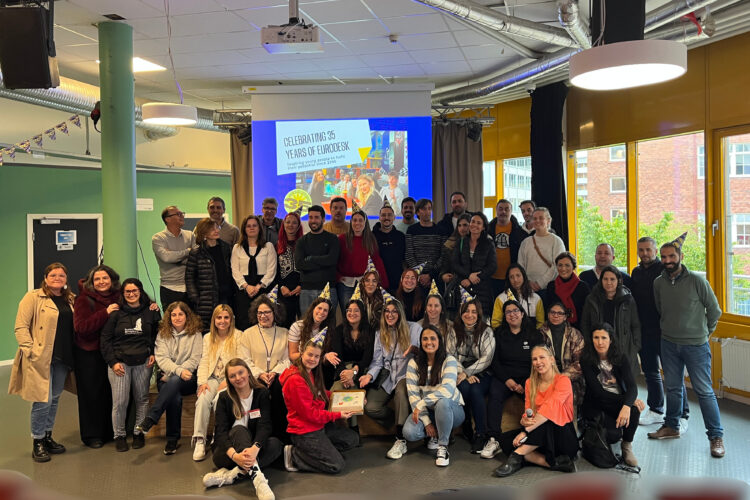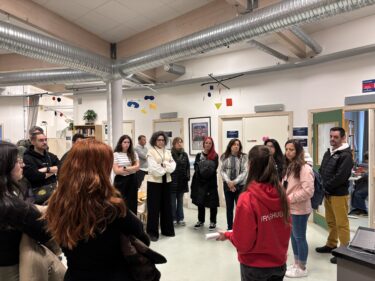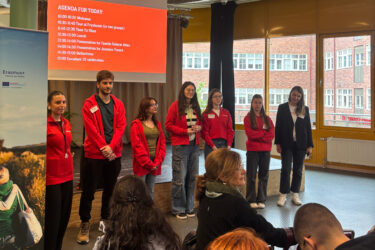
Celebrating 35 years of Eurodesk: "The More We Know Each Other, the Stronger We Become"
Founded in 1990, Eurodesk is celebrating 35 years as a leading European youth information network supporting young people in accessing information about various types of opportunities — mobility, scholarships, internships.
Finding clear and relevant European information was a real challenge in many EU Member States. Eurodesk was created to change that — by collecting important resources in one place, making them easier to understand, and tailoring them to the needs of young people and youth professionals. From the start, it was also clear that simply providing information wasn’t enough — raising awareness about European opportunities within the youth sector would be just as important.

Operating in 36 European countries, now Eurodesk consists of 38 national centres that collaborate with local information providers. Together, they promote European opportunities and inspire young people to engage in civic life. The network includes more than 3,000 local organizations — known as multipliers and ambassadors — that offer guidance and information on mobility opportunities directly to young people.
Apart from being one of the largest youth centres with a wide range of programmes for young people, Fryshuset also serves as a local Eurodesk contact centre (as one of 28 Eurodesk multipliers in Sweden, since 2015). In collaboration with Eurodesk Brussels Link — a European information network that helps young people navigate international mobility opportunities — Fryshuset is always up to support you in discovering free and life-changing opportunities.
If you’re unsure where to start or need help finding opportunities that match your interests, feel free to reach out via eurodesk@fryshuset.se. Fryshuset’s center joined the Eurodesk initiative in 2015 and has since been actively working to:
- provide free information, support, and guidance to all young people without discrimination;
- have qualified staff who provide objective information, take into account young; people’s individual needs and questions, and base the information on experiences and real stories;
- refer to other information services or organizations;
- help ensure that young people have access to local and regional information throughout Europe;
- prioritize information about EU funding programs;
- work with trustworthy sources.
In addition to helping young people explore opportunities that match their interests, Fryshuset also runs the Time to Meet initiative. This weekly event gives young people, school staff and youth workers the chance to sit down with national and international Fryshuset volunteers to talk about opportunities within EU. Time to Meet takes place every Tuesday at Fryshuset and is open to all curious minds interested in making a difference in their communities or exploring opportunities abroad.

“It’s important for young people to speak with other volunteers because we can share real, personal experiences – not just theory. We know how it feels to live and volunteer abroad, so our advice is honest and relatable. At “Time to Meet” we as volunteers in Sweden talk honestly about what it’s like to volunteer abroad — the good parts and the challenges. It’s easier to connect with someone your age who has actually done it. That makes the idea of volunteering feel more real and possible.” — ESC volunteer Kristine Khachatryan.
To mark this 35th anniversary of Eurodesk, youth workers and multipliers from various Eurodesk contact points across Portugal gathered at Fryshuset. During the event, we talked with Bárbara, a Eurodesk multiplier from Maia municipality, about the power of mobility.
Why do you think European mobility matters in 2025?
“We as a society nowadays are facing new challenges — not only locally, but globally. We’re seeing threats to democracy, the rise of populism and extremism. And as we heard today, we as a society have the obligation to know the other so that we can accept others and embrace differences. We can only understand what we experience and what we learn.
If we stay in our backyard and never get to know our neighbor, how can we accept them? We can’t. So instead, we begin to see them as threats. That’s why I believe mobility — and opportunities that take us outside our comfort zones — help us become better neighbors, better people. That’s how we build Europe together.”
What surprised you the most about working across borders and cultures?
“The differences — but more than that, the similarities. Portugal and Sweden are two completely different countries. But we all face struggles. We all have similarities. And we all share the same goals: to live in a society that’s safe and inclusive, to grow — personally, professionally, emotionally, and economically. So, the biggest surprise was that the similarities are stronger than the differences. That’s what helps a society survive.”
Text: Anastasiia Savenko
Photo: Fryshuset